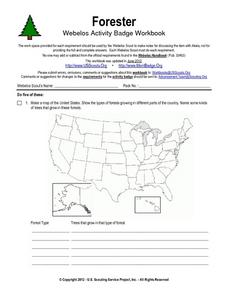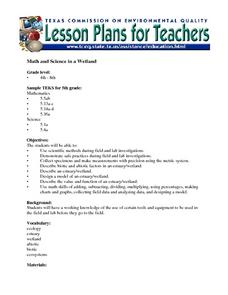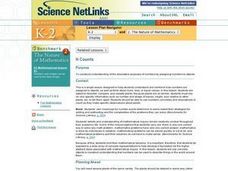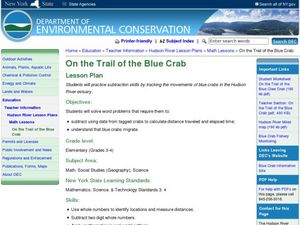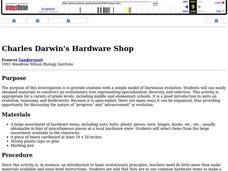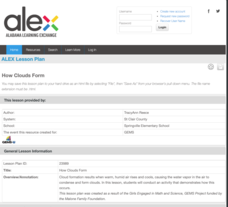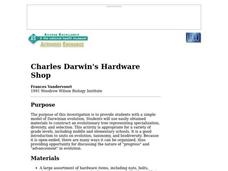Curated OER
Add and Subtract with Hudson River shipping
Rivers aren't just a place for animals to live, they also provide industrial transportation. The class will examine the Hudson River on a map, discuss all the commercial vessels that use the River to transport materials, then complete a...
Resources for Educators
Math & Science Connection
Whether you're using a collection of Dr. Seuss books to teach basic math skills like counting, adding, and subtracting, or exploring the different states of matter by melting a crayon with a hairdryer, a series...
Curated OER
Forester
In this forester worksheet, students illustrate a map that shows the types of forests growing in various parts of the country. They also identify six forest trees common to the area where they live and explain how both wildlife and...
Curated OER
Marvelous Marbles
Students predict the change in water volume when adding marbles to a graduated cylinder. In this Chemistry lesson plan, students will need to make accurate water measurements to determine the fluid displaced by the marbles. The students...
Curated OER
Making Changes
Students observe and record the changes they see when adding heat and cold to objects. In this changes lesson plan, students experiment with different objects and see if heat and cold change the makeup of the object. They then record...
Alabama Learning Exchange
The Very Hungry Class
Students listen to a read aloud of Eric Carle's, The Very Hungry Caterpillar, as an introduction to their study of the metamorphosis of a butterfly. They participate in a number of cross-curricular activities in this unit of lessons.
Curated OER
Math and Science in a Wetland
Students describe safe practice when doing field and lab investigations in a estuary or wetland. They create a model of an estuary and describe their value and function. They participate in field study in which they collect and analyze...
Curated OER
Tracking the Salt Front
Using the Hudson River as the focus, learners discuss the difference between salt water and fresh water environments, analyze maps and graphs, and complete addition and subtraction problems. This lesson comes with a wealth of...
Curated OER
It Counts
Learners classify and compare plants using specific information, observations, and numbers. In this mathematical inquiry lesson, students use plant characteristics to describe, compare, and classify them. They attempt to develop a system...
Teach Engineering
Gumdrop Atoms
There's nothing sticky about the resource, unless you count the gumdrops! Scholars create a model of a lithium atom, complete with protons, neutrons, and electrons. It's just that these models are made with gumdrops and toothpicks.
Curated OER
On the Trail of the Blue Crab
Third graders read the article "Blue Claw," discuss crab migration, and look at a map of the Hudson River. They complete a worksheet where they must use subtraction to determine the distance migrating crabs travel.Web links, article, and...
Curated OER
Charles Darwin's Hardware Shop
Using an assortment of hardware, junior biologists explore the theory of evolution. They consider how simple pieces of hardware might be changed into similar items and display their discoveries on a poster. The lesson would be...
Alabama Learning Exchange
How Clouds Form
Young scholars analyze how clouds form. In this cloud formation lesson plan, students brainstorm types of clouds and what they think they're made of. Young scholars conduct an experiment to see how clouds form and discuss their...
Curated OER
Stream Table
Young scholars build and erode a hillside. In this earth science lesson, students build a five inch hillside in a paint pan using sand, soil, and pebbles. They pour water over the hillside to monitor the erosion and how it is...
Curated OER
Math and Science in a Wetland
Students use scientific methods during field and lab investigations. Students collect specimens and make measurements using the metric system. Students describe biotic and abiotic factors in an estuary and design a model.
Curated OER
Scientific Measurement and Conversion
In this measurement worksheet, students review the rules of dimensional analysis and then determine if the 3 equations given follow the dimensional analysis rules.
Curated OER
Charles Darwin's Hardware Shop
Young scholars construct an evolutionary tree representing specialization, diversity, and selection using easily obtained materials. They use at least twenty pieces of hardware to classify then develop "evolutionary" relationships...
Curated OER
It Counts
Students understand and reinforce how numbers are assigned to objects, as well as think about more, less, or equal values. In this lesson, students are asked to describe, compare, and classify plants. They should be able to use numbers...
Curated OER
Finding the Salt Front
Learners discuss definitions of estuary, salinity, and the salt front. They listen as the teacher explains the Hudson River Miles and ways the upriver and downriver sections relate to the north and south. Students graph the salt front...


